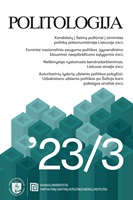Foreign Policy Change Under Authoritarian Leaders: Analysis of Uzbekistan’s Foreign Policy in the Post-Cold War Era
Foreign Policy Change Under Authoritarian Leaders: Analysis of Uzbekistan’s Foreign Policy in the Post-Cold War Era
Author(s): Feruza MadaminovaSubject(s): Governance, Government/Political systems, Political behavior, Sociology of Culture, Sociology of Politics
Published by: Vilniaus Universiteto Leidykla
Keywords: Foreign policy change; leadership trait analysis; perceptions; leadership style; authoritarian leader; Uzbekistan;
Summary/Abstract: The growing study of foreign policy change offers various explanations of change and continuity in foreign policy. By focusing on the actors of foreign policy decision-making, past scholarship has mainly concentrated on the role of institutional and noninstitutional factors in foreign policy change. However, decentralized decision-making is more relevant to democratic regimes than authoritarian regimes. Despite the abundance of case studies on foreign policy making in nondemocracies, advancements in the conceptual understanding of foreign policy change in authoritarian regimes are still needed. Addressing Uzbekistan’s foreign policy, this article proposes an advanced framework to explain why and how foreign policy change takes place under authoritarian leaders. A leader’s perception of the external environment is argued to be a decisive factor inducing authoritarian leaders to (re)consider their regime survival strategy. Concern with regime survival, in turn, shapes foreign policy goals which are manifested in distinctive foreign policy behavior of a leader. Ultimately, the behavior of a leader translates into certain foreign policy outcomes.
Journal: Politologija
- Issue Year: 2023
- Issue No: 3 (111)
- Page Range: 113-162
- Page Count: 50
- Language: English

